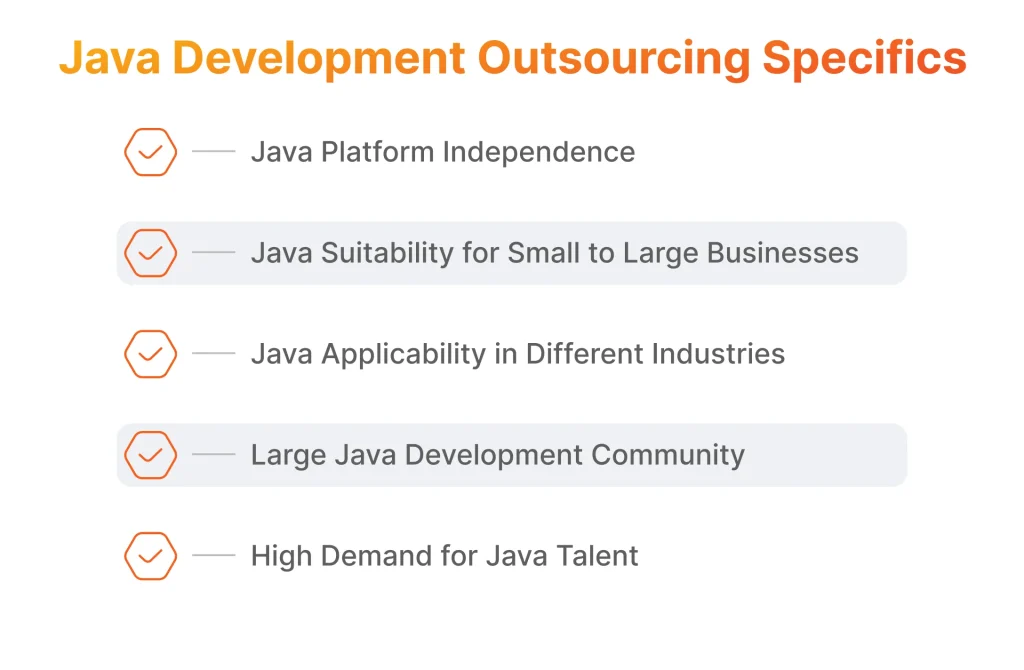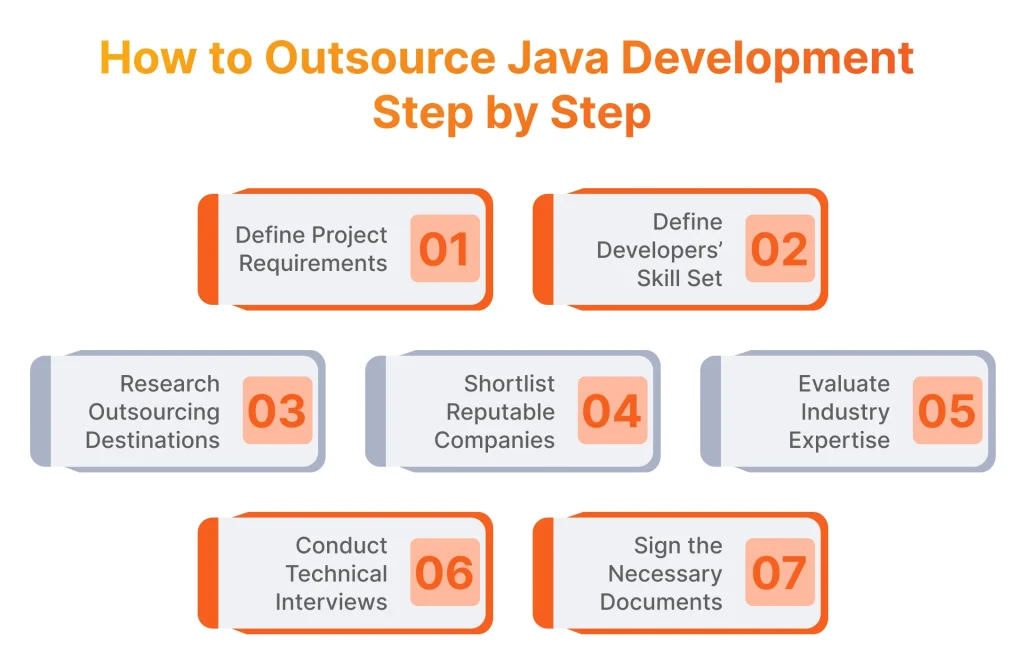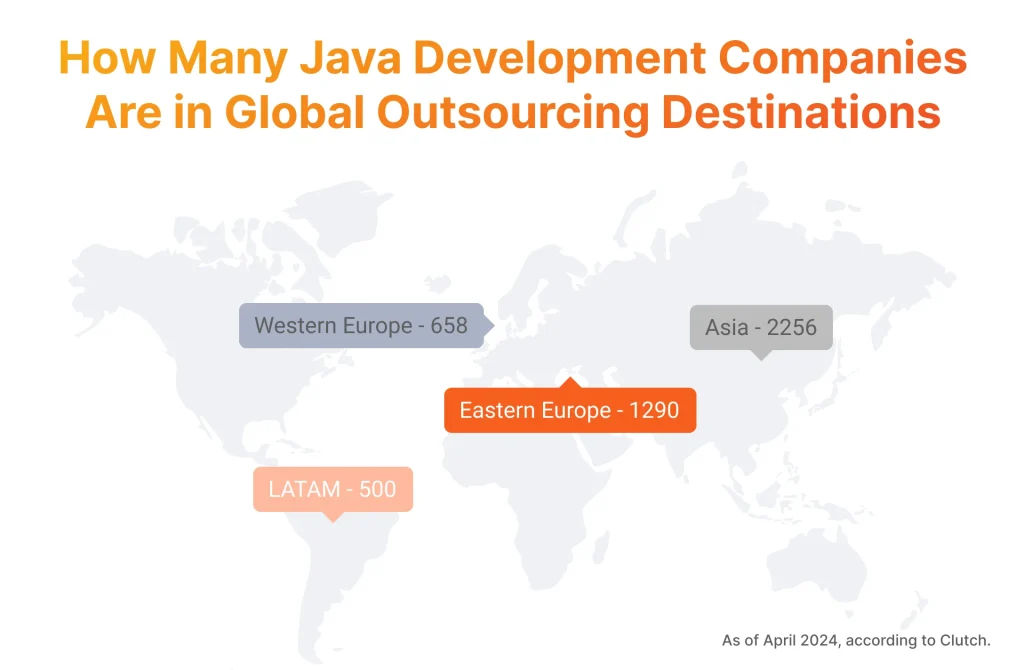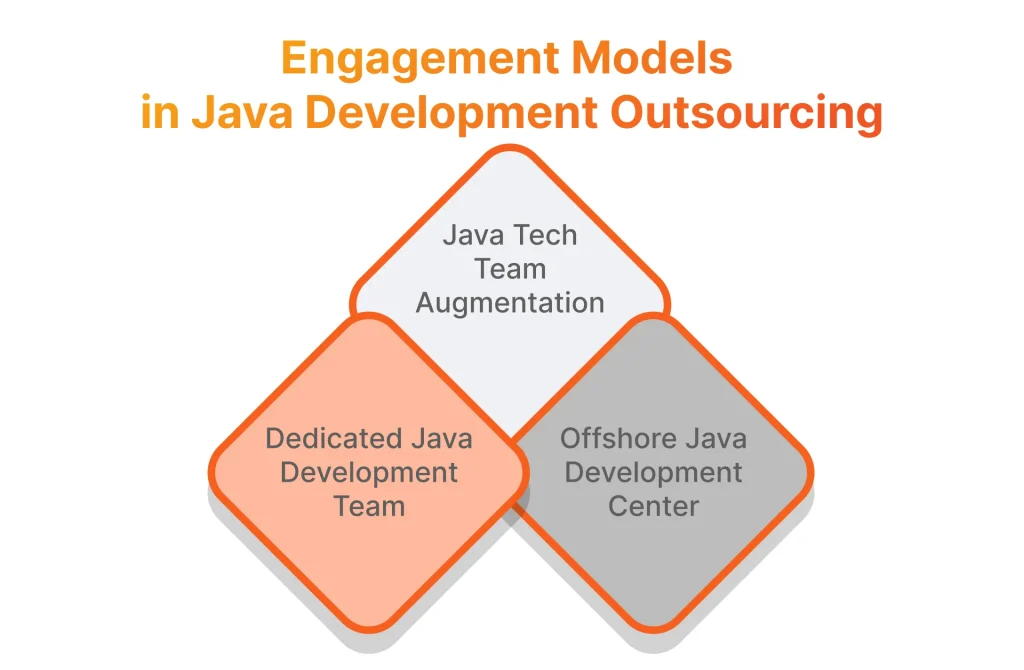Since its inception, Java has been heavily utilized by enterprises and continues to maintain its prominent position in the coding domain. According to the 2023 New Relic report, the user adoption of Java 17 experienced a remarkable 430% growth within a single year.With its superior performance compared to many competitors, Java remains the preferred choice for application development by most organizations. If you’re considering starting a new project with Java as its core technology, we’ll assist you in determining when outsourcing Java development is the ideal choice and provide guidance on hiring and managing a development team.
The Specifics of Java Development Outsourcing You Should Know
Java’s popularity is rooted in its versatility and reliability, rendering it the preferred option for projects of diverse scopes and complexities. Its robust features and extensive libraries enable it to meet the varied demands of industries spanning finance to eCommerce.
This extensive adoption across sectors strengthens Java’s position as a fundamental expertise delivery area within software development services. Let’s delve into what attributes contribute to Java’s undeniable appeal across such a broad spectrum of projects, especially those outsourced offshore.

Java Is Platform-Independent
Platform independence is one of the most significant strengths of Java. This characteristic stems from its design principle of “write once, run anywhere” (WORA). Java achieves this platform independence through its compilation process, where Java source code is compiled into an intermediate bytecode. This bytecode is then executed by the Java Virtual Machine (JVM), which is platform-specific. Thus, outsourcing Java development is suitable for:
- Desktop App Development: Because the JVM is available on most platforms, including Windows, macOS, Linux, and others, Java apps can run seamlessly on any system with a compatible JVM installed. This eliminates the need for the Java development team to rewrite or modify their code for different platforms.
- Web App Development: Java programming can also be used for web applications through Java Servlets or Spring Framework.
- Mobile App Development: Serving as the primary programming language for Android, Java expertise makes it a key point for mobile app development outsourcing. This programming language provides developers with a robust and reliable framework for building mobile applications. This support extends beyond basic app functionality to encompass a wide range of features, including multimedia, networking, and user interface design.
Java Suits Businesses of Different Sizes
Whether you’re seeking to hire software developers for a startup or an established business, Java’s service-oriented architecture is well-suited for creating custom solutions tailored to meet specific business needs. Let’s explore the specific requirements that Java developers can meet, while building applications for organizations of different sizes.
For Startups
- Cost-Effectiveness: Java’s open-source nature and the availability of numerous free tools and frameworks make it a cost-effective choice for startups.
- Scalability: Java’s ability to handle increased traffic and data volume ensures that startups can scale their technology infrastructure without major disruptions.
- Versatility: Startups can adapt their software quickly and efficiently thanks to the wide array of frameworks and tools available.
For Small and Medium Businesses (SMBs)
- Robustness and Reliability: Robust features, such as strong type safety, built-in exception handling, and automatic memory management, contribute to the development of secure and stable applications that SMBs can depend on.
- Integration Capabilities: Java’s compatibility with multiple databases, APIs, and enterprise systems enables SMBs to integrate their Java applications seamlessly with accounting, CRM, and inventory management tools, and more.
With the strength and seamless integration capabilities of Java readily available to us, we delivered a cutting-edge funding platform for our client, offering real-time financing solutions to businesses. The platform boasted a diverse array of functionalities, seamlessly integrated with banking service providers, payment card printers, Single Sign-On (SSO) services, and money transfer services, ensuring comprehensive support for our client’s operations.
Our efforts resulted in the platform that facilitates thousands of SMB customers, enabling our client to tap into new market niches and attract a fresh influx of merchants.
For Enterprises
- Enterprise-Grade Features: Multithreading, distributed computing, and enterprise security protocols are part of Java’s features. They allow making software well-suited for building mission-critical applications.
- Long-Term Support and Stability: Java’s backward compatibility and long-term support from Oracle and the Java community ensure that organizations can maintain and evolve their Java-based applications.
- Scalability and Performance: Scalability and performance capabilities, combined with technologies like Java Enterprise Edition and microservices architectures, enable enterprises to build high-performance and resilient applications.
Willing to know more about outsourcing for enterprise-scale software?
Check our 6 tips to help CTOs in outsourcing product development!
Java Suits Different Industries
Java development projects span across diverse niches. This programming language serves as the foundation for businesses to innovate and grow, thanks to its cost-effectiveness, rich capabilities, ability to scale, and robustness. Financial services, insurance, and retail are among the most common industries that use Java, as reported by Statista. Below, we’ll delve into the reasons behind this trend.
Fintech
Java’s strong support for multi-threading, high-performance computing, and transaction processing makes it well-suited for building complex finance management systems that can handle high volumes of transactions with low latency.
Additionally, Java’s extensive libraries and frameworks, such as Spring and Hibernate, provide developers with tools to accelerate development and ensure compliance with regulatory requirements.
We recently restructured mission-critical business systems for BlackHawk Network Inc., a leading provider of branded payment technology solutions in the US. Our work resulted in the development of a custom consolidated platform that seamlessly integrates various operations without causing any disruptions for this industry-leading company, which has over 37,000 corporate and government partners.
eCommerce
Java has an object-oriented nature, along with its extensive ecosystem of libraries and frameworks like Spring Boot and Hibernate. That enables developers to build scalable and feature-rich eCommerce applications. Java’s platform independence also ensures that eCommerce websites and applications can run smoothly across different devices and operating systems.
On top of that, Java’s support for enterprise integration and distributed computing enables eCommerce businesses to integrate with third-party services, manage inventory efficiently, and handle complex business processes.
Legaltech
Java’s reliability, security features, and scalability make it an ideal choice for developing Legaltech solutions. Legal applications often handle sensitive and confidential data, requiring robust security measures, which Java’s extensive security libraries and protocols can provide. Moreover, Legaltech solutions may need to integrate with existing systems and databases, and Java’s interoperability and compatibility make it easy.
Thus, a document management technology provider, specializing in digitizing, storing, sending, and managing documents turned to us for Java outsourcing services. The company sought enhancements to bolster security and efficiency of their operations. Leveraging our expertise, we implemented DB multi-tenancy and introduced a cloud disaster recovery option, significantly elevating the security standards. Additionally, our optimizations led to a remarkable 10x reduction in file-downloading time within the S3 Cloud environment, slashing download times from approximately 20 minutes to less than 2 minutes.
Java Benefits from a Large Tech Community
Developer Nation’s findings show that the count of software developers engaged with Java amounted to 17.1 million individuals in the first quarter of 2023. Java’s broad community fosters a culture of knowledge sharing, providing developers with access to a vast array of tutorials, forums, and resources. This collaborative environment accelerates learning and problem-solving, empowering developers to overcome challenges more efficiently.
Another reason why Java remains one of the most highly-used programming languages is the fact that its community actively contributes to the language’s evolution and enhancement. Through open-source projects, bug reports, and feature requests, developers shape Java’s future, ensuring it remains relevant, up-to-date, and equipped with the latest tools and features.In addition to technical support, the Java community offers guidance, mentorship, and networking opportunities. Java developers can connect with peers, industry experts, and potential collaborators through meetups, conferences, and online communities.

Andrii Semitkin
Delivery Director at SPD Technology
“Due to the robust tech community, outsourcing Java development grants organizations the flexibility to adjust their development teams according to project requirements. Vendors can swiftly allocate resources and modify team sizes to accommodate shifting project scopes, timelines, and priorities.”
Java Is in High Demand
Java’s unparalleled versatility, platform independence, robust ecosystem, widespread enterprise adoption, and extensive community support solidify its status as one of the most enduring and popular programming languages. The Statista report ranks Java as the seventh most used programming language globally in 2023, further underscoring its widespread relevance and importance in the IT niche.
How to Outsource Java Development Projects Step by Step
A rigorous hiring process is crucial to select a Java outsourcing company capable of meeting project expectations. Below are the stages of the process for outsourcing Java development services.

Define Project Requirements
It’s essential to establish clear expectations for the end product to outsource Java development. For instance, let’s consider creating an Android web app for personal budget management as an example. To effectively organize your objectives and progress with the project, it’s necessary to define the functional, non-functional, and business requirements. Some of them you can see in the table below.
| Functional requirements | Non-functional requirements | Business requirements |
| User Authentication: secure registration & login, password management. | Performance: handling of a large number of simultaneous users, fast loading times. | Budget: costs for development, tools, licenses, infrastructure, support. |
| Account Management: updating personal info & passwords, delete accounts. | Security: data encryption, MFA, secure password storage, session management. | Timeline: duration for each phase, key milestones, deliverables, and deadlines. |
| Transaction Tracking: Record, categorizing and search of transactions. | Usability: intuitive, user-friendly, and aesthetically pleasing design, accessibility. | Vendor Management: roles & responsibilities, communication channels. |
| Budget Planning: expense categories & spending tracking. | Scalability: app must be capable of scaling both vertically and horizontally. | Change Management: consider requirements, scope & deliverables changes. |
| Expense Analysis: dashboards for spending patterns and trends | Reliability: backup & recovery mechanisms, resilience to system & network failures. | QA: testing methodologies, criteria, metrics for manual and automated testing. |
| Bill Reminders: notifications for recurring bills or payments. | Compatibility: support for different devices, screens, and systems, browsers. | Communication & Reporting: channels for communication and reporting. |
| Goal Setting: adjusting or modifying goals, alerts for goal achievement. | Maintainability: well-organized codebase & up-to-date documentation. | Post-Implementation Support: scope and duration of maintenance & support. |
Define Developers’ Skill Set
To find skilled app developers capable of delivering projects tailored to your business needs, conducting interviews and assessments is crucial for complete assurance. Here are the core competencies to consider during the hiring process, supposing you need an Android web app for personal budget management:
- Technical Proficiency: Assess the developers’ proficiency in Java and its frameworks such as Android SDK, Retrofit, or Room for database management. Also, knowledge of XML for layout design and Gradle for build automation is essential.
- Android Development Experience: Look for a proven track record of building Android apps, preferably those similar in complexity to yours. Experienced Java developers should be familiar with Android architecture components, such as ViewModel and LiveData, as well as modern design patterns like MVVM or MVP.
- Front-end Development Skills: Developers should have experience with Android UI components, Material Design guidelines, and responsive layout design.
- Back-end Development Skills: For a personal budget management app, the Java development team may need to interact with APIs for data synchronization or integrate with cloud services for storage. Look for experience with server-side frameworks like Spring Boot or Node.js and knowledge of RESTful API design principles.
- Database Management: Check the experience with SQLite for local storage on Android devices or knowledge of relational databases like MySQL or PostgreSQL for server-side storage.
- Debugging Skills: Skilled Java developers should be proficient in unit testing frameworks like JUnit and UI testing frameworks like Espresso.

Andrii Semitkin
Delivery Director at SPD Technology
“Beyond proficiency in Java programming, developers must possess a deep understanding of related technologies such as Spring Framework, Hibernate, and Maven. Additionally, strong problem-solving skills, familiarity with design patterns, and experience with agile methodologies are essential for navigating the complexities of development.”
Research Java Development Outsourcing Destinations
When researching the opportunities to hire a Java development team from abroad, several regions and countries stand out as popular choices due to their strong technical talent pool and favorable business environments. Below are some key destinations to consider.

LATAM
According to Clutch, there are 500 companies in Latin America that offer Java development services. Brazil, Mexico, Argentina, and Colombia are emerging as attractive destinations for companies willing to hire specialists in Java programming.
Outsourcing to Latin American developers is a well-suited distributed software development option for North American clients due to the proximity of time zones and lower rates, compared to the USA.
Western Europe
Clutch lists 658 companies in Western Europe offering to outsource Java development. Countries such as Germany, Ireland, and France are known for their highly skilled developers. While these countries typically have higher rates, their professionals can be a favorable option for European clients due to shared time zones and languages.
Eastern Europe
According to Clutch, Eastern Europe is the location for 1290 firms that can serve as your outsourcing partner for development projects. Countries like Ukraine, Poland, and Romania feature experienced professionals and competitive rates compared to those in Western Europe.
These countries often have a strong educational background in computer science and engineering, resulting in a talented pool of Java developers. Additionally, English proficiency is generally high, which facilitates communication with international clients.
Asia
India and China have large and rapidly growing IT industries, while Vietnam, Indonesia, and the Philippines are becoming increasingly popular for software development outsourcing. Overall, Clutch lists 2256 IT companies from Asia that have Java development teams. These countries boast a large talent pool of experienced developers and offer cost-effective services.
Willing to know all the details about offshore software development?
Check our complete guide!
Shortlist Reputable Companies Within the Chosen Location
Once you know which skills you need for the project and where to look for a partner, conduct thorough research to identify a Java outsourcing company with a strong reputation, positive client reviews, and a portfolio of successful projects. Consider factors such as company expertise, industry knowledge, and certifications to create a shortlist of potential partners that align with your project requirements.
Evaluate Industry Knowledge and Expertise
Once you’ve shortlisted companies, check if they are proficient with the projects in your industry. Assess their experience in Java development, technology stack proficiency, and domain expertise. Look for evidence of past projects similar to yours to avoid any issues during the actual development process.
Conduct Interviews and Check Technical Skills
After you find preferred outsourcing partners, conduct interviews and check technical skills. Schedule meetings with representatives from the shortlisted companies to discuss your project in detail. Evaluate their communication skills, responsiveness, and understanding of your objectives.
Additionally, request examples of past development projects and inquire about their project management approach. Conduct technical assessments or coding tests to assess the proficiency of their developers.
Discuss and Sign the Necessary Documents
Once you’ve found a Java outsourcing company that best suits your project, finalize the deal by signing legal papers to cement the partnership. The documents you may need to sign are:
- Non-Disclosure Agreement (NDA): A legal contract that ensures confidentiality between parties, prohibiting the sharing or disclosure of sensitive information to third parties.
- Master Services Agreement (MSA): A contract outlining the terms and conditions for a long-term business relationship between parties, typically including terms related to scope of work, payment, intellectual property, and dispute resolution.
- Statement of Work (SOW): A document detailing the specific tasks, deliverables, timelines, and responsibilities for a project, serving as a blueprint for the work to be performed under a larger contract, such as an MSA.
- Service Level Agreement (SLA): A contract specifying the level of service a provider will deliver, including performance metrics, availability, response times, and penalties for failing to meet agreed-upon standards.
- Intellectual Property (IP) Agreement: A legal document outlining the ownership, usage rights, and protection of intellectual property developed or exchanged during a business relationship, often addressing issues such as ownership of code, patents, and trade secrets.
Looking for in-depth insights on outsourcing app developers?
Explore our 6 hands-on tips!
How to Manage an Outsourced Java Development Team?
So, your team is prepared for the development process, yet establishing collaboration rules remains essential. There are several engagement models in software development outsourcing. We will consider them below and provide specific tips on how to manage your outsourced team depending on the model of your choice.

Java Development Team Augmentation
IT staff augmentation refers to the practice of supplementing an organization’s internal IT team with external resources, typically provided by an IT outsourcing company. Instead of hiring new experienced Java developers, the organization hires temporary or contract workers to fill specific skill gaps, meet project demands, or handle increased workloads.
Management Tips:
- Facilitate Integration: Foster open communication, align processes, and promote a shared project vision to seamlessly integrate the outsourced Java development team with the in-house team.
- Ensure Effective Onboarding: Provide comprehensive onboarding and training to seamlessly integrate new team members into the project. Grant access to project documentation, tools, and resources to align with the in-house team’s practices and standards.
- Embrace Flexibility: Be adaptable to changes in project requirements, team dynamics, and resource allocations. Scale the augmented team up or down based on evolving project needs and priorities.
Dedicated Java Development Team
Assembling a dedicated team of Java developers means hiring them to work exclusively on a particular project or set of projects for a client. This model offers clients access to a pool of skilled resources managed by the outsourcing provider, yet the client has full control over the dedicated development team management and composition. The dedicated team operates independently, leveraging their skills and expertise to develop the required product without requiring any additional manpower from the client’s side.
Management Tips:
- Establish Project Objectives and Goals: Define clear project objectives, milestones, and Java software development tasks for the team to align with core business priorities and project requirements. Communicate the project vision and expectations to provide clarity and direction.
- Encourage Autonomy and Ownership: Empower new team members to take ownership of their tasks and make autonomous decisions. Foster a culture of accountability, trust, and responsibility.
- Supply Sufficient Resources and Support: Ensure the team has access to the required resources, tools, and support for the development process. Address any infrastructure or technical issues promptly to minimize downtime and delays.
Offshore Java Development Center
Setting up an offshore Java development center involves establishing a dedicated Java development company or team in a location outside of the client’s home country. This center serves as a strategic extension of the client’s in-house development capabilities, providing access to experienced developers, infrastructure, and resources in a cost-effective offshore location.
Management Tips:
- Enhance Project Governance: Create robust project governance and oversight mechanisms to ensure adherence to project requirements, quality standards, and delivery timelines. Conduct regular project reviews, status updates, and performance evaluations to monitor progress and address issues proactively.
- Manage Time Zone Differences: Effectively handle time zone disparities by establishing overlapping working hours, scheduling regular meetings, and utilizing collaboration tools to facilitate real-time communication and collaboration between onshore and offshore teams.
- Foster Cross-Cultural Collaboration: Promote collaboration and teamwork across cultures by cultivating a supportive and inclusive work environment. Encourage knowledge sharing, mutual respect, and cultural exchange to leverage diverse perspectives and drive innovation.
Conclusion
Outsourcing Java development in 2024 offers businesses unmatched opportunities for expertise, cost-effectiveness, and flexibility. Java’s platform independence and robust capabilities make it ideal for diverse development projects across industries, including desktop, web, and mobile app development, ensuring scalability and versatility. Startups benefit from its cost-effectiveness and scalability, while small to medium businesses appreciate its reliability and integration capabilities. Enterprises rely on Java for its enterprise-grade features, long-term support, and scalability.
If you decide to outsource Java development, outline functional, non-functional, and business requirements, define required developer skills, choose an outsourcing destination, shortlist and interview candidates, and secure a flexible engagement model to ensure uninterrupted development process and desired results. As a trusted outsourcing provider, we have rich experience in delivering projects for specific businesses, so do not hesitate to hire a dedicated development team at SPD Technology.
FAQ
- How to Outsource Java Development?
To hire a Java outsourcing company, start by defining project requirements clearly. Then, research and select a reputable partner with expertise in Java development within a specific location suitable for your team. Interview and assess technical skills of the candidates and choose a preferred engagement model for future collaboration. And, of course, establish open communication channels and effective project management processes to ensure smooth collaboration throughout the project lifecycle.
- What Are the Best Companies to Outsource Java Development?
The Java outsourcing companies are often those with a proven track record of delivering high-quality Java solutions. Look for companies with extensive experience in Java development, strong technical expertise, a diverse portfolio showcasing successful projects, and positive client reviews and testimonials.
- What Is Included in Java Development Outsourcing Services?
Java outsourcing services typically encompass a range of activities, including development, testing, maintenance, and support. Additionally, companies may offer project management services to oversee development, quality assurance, and documentation services. Other services may include performance optimization, scalability enhancements, and integration with existing systems.


